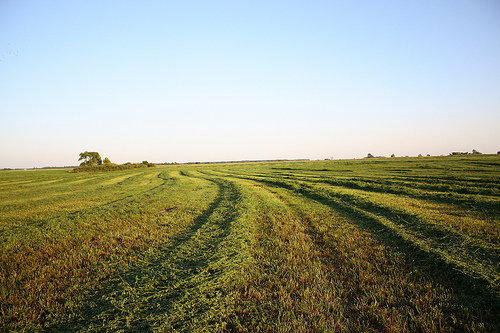
Agricultural News
Noble Foundation Genome Project Reveals Origin of Plant Traits
Thu, 17 Nov 2011 08:41:50 CST
 More than a decade ago, The Samuel Roberts Noble Foundation served as a catalyst for an international research project that today is revealing the origin of invaluable traits in legumes (i.e. alfalfa, soybean and peas) that could have a significant impact on global agriculture.
More than a decade ago, The Samuel Roberts Noble Foundation served as a catalyst for an international research project that today is revealing the origin of invaluable traits in legumes (i.e. alfalfa, soybean and peas) that could have a significant impact on global agriculture.
In the late 1990s, the Noble Foundation funded the start of a major project to sequence the whole genome of the legume Medicago truncatula (commonly called barrel medic). Instead of looking at a few genes in isolation, the genome project sequenced the plant's entire collection of DNA, allowing researchers to use Medicago as a model species for the study of other agriculturally significant legumes like the closely-related alfalfa.
The Medicago genome project has yielded masses of data about legume gene structure and function. More specifically, it enables scientists to understand how legumes evolved one of their most vital functions symbiotic nitrogen fixation.
Legumes have the ability to grow without nitrogen fertilizer by virtue of a symbiosis they form with bacteria called rhizobia, which convert atmospheric nitrogen (N2) to ammonia (NH3) that is used for plant growth. The symbiosis takes place in root nodules, specialized organs that accommodate millions of the nitrogen-fixing bacteria. The Medicago genome sequence provides insight into the evolution of nodules and symbiotic nitrogen fixation.
"Legumes are critically important to sustainable agriculture," said Rick Dixon, D.Phil., director of the Plant Biology Division. "They fix atmospheric nitrogen so effectively that they can improve the soil for other crops and reduce the need for nitrogen fertilization by agricultural producers. This provides a significant economic advantage to the farmer and reduces the environmental impact of agriculture."
While Medicago truncatula is not itself grown for human food, researchers will use knowledge derived from the genome project to enhance nitrogen fixation in other legumes used for food crops, and, in the future, maybe even develop the trait in crops like corn, which cannot currently fix their own nitrogen.
"The Medicago genome sequence will serve as a point of reference for understanding vital gene functions of importance to agriculture," said Michael Udvardi, Ph.D., professor at the Noble Foundation. "It will improve our ability to breed better alfalfa and serve as a springboard to tackling the alfalfa genome. Developing the nitrogen fixation trait in other crops would help to maintain or increase global food production while decreasing nitrogen fertilizer inputs. This project is a big step towards lower-input, more sustainable agriculture."
The Medicago genome sequence and insight into the evolution of symbiotic nitrogen fixation was published in this week's edition of Nature.
"This was an international effort that achieved a global outcome," Dixon said. "Receiving recognition from Nature, one of the most highly esteemed scientific journals, highlights the importance of the research and underscores the vital nature of these international collaborations."
While the Noble Foundation made the initial $5 million investment in the genome sequencing project, public funding bodies in the United States (the National Science Foundation), the United Kingdom and France contributed to the project. The NSF cited it as an example of a successful public-private partnership to advance science and commit important research data to the public.
The project included researchers and sequencing laboratories at the University of Minnesota, University of Oklahoma, J. Craig Venter Institute, Genoscope, the Welcome Trust Sanger Institute, CNRS/INRA-Toulouse, John Innes Centre, Noble Foundation, University of Wageningen, MIPS, Ghent University, and the National Center for Genome Resources (NCGR). Altogether, there are 124 co-authors at 31 institutions in eight countries.
"This was a high quality genome sequencing project. It provides accurate and reliable information that will be studied for years," Dixon said. "There has also been a revolution in sequencing technology since we began this project. The next generation of sequencing technology does in months what it took years to do previously. This means the next genome project will happen more quickly and cheaply. We truly are in a new era of genomic research. That is good for agriculture and the world."
WebReadyTM Powered by WireReady® NSI
Top Agricultural News
More Headlines...




















